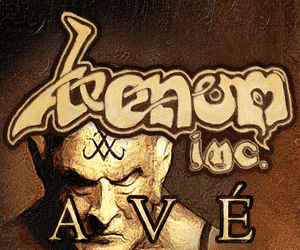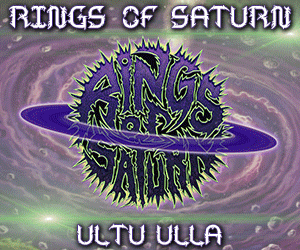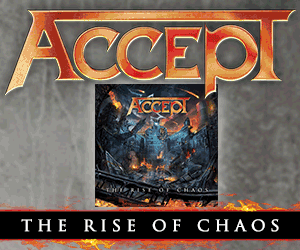Brisbane’s pop-punk upstarts Two Times Shy are soaring lofty heights as they let loose their …

“When I die, it’ll be nothing.” These are the ominous words chosen by Andy Marsh, guitarist, lyricist and conceptual mastermind for Australian deathcore giants Thy Art Is Murder, when asked to describe the group’s latest sonic offering, Dear Desolation.
“That’s what I want people to be thinking and feeling when they listen to the music, and when the album finishes,” says Marsh. “I don’t want to give away my little finish at the end of the last song, but I feel as it accelerates toward that, it was just this sense of my life going faster and faster and faster and faster, and then it’ll just be nothing.” While there’s certainly no denying that Marsh’s sentiment is a bleak one, uncomfortable truths and misery as an abstract do often go hand in hand. If you’ve ever tried to contemplate your own death—and the existential gulf of complete, total and unavoidable absence that’s sure to follow it—then you might just have a predisposition to the overall message behind Dear Desolation. “I’m not saying it’s good or bad; that it has any benefit to anyone,” explains Marsh. “It’s just something that if you think about long enough, while listening to this record, you might just get a little bit depressed.”
More than just a depression session, Dear Desolation feels almost like a personal address; a resignation to humanity’s eventual fate; a dirge of universal emptiness and insignificance. As part of the writing process however, the album gave the band a unique opportunity to refine the antagonism of their youth. “It kind of stems away from being driven by anger in purely a religious or political context, and picks apart the social and environmental issues that we’re facing right now,” says Chris ‘CJ’ McMahon, frontman and vocalist for Thy Art Is Murder, when discussing the band’s progression and growth across their loosely connected album ‘trilogy’: 2012’s visceral, ARIA Award-nominated Hate, 2015’s intense Holy War, and their upcoming fourth album Dear Desolation. “Hate was just all of the things in the world that we were pissed off with, and we were touching on a lot of political and religious stuff, about people in general,” explains McMahon as Marsh agrees, adding that he “didn’t have a focused vision,” and felt that Hate was “mostly just unbridled aggression.” Using their increased popularity to consolidate their creative efforts against organised religion and anti-fundamentalism, the group’s next album brought about increased focus and musical venom. “Holy War was a lot of storytelling around the same sort of themes as Hate, but it was more of a war on all things holy, hence the name,” says McMahon, “And now with Dear Desolation, it’s kind of the end of that trilogy: everything’s barren, there’s nothing left and nothing will live again.”
This existence is all just a transitory experience, and then it’s done. There was nothing before my existence and there’ll be nothing after. I don’t know what that means but that’s what I think it is.
[ANDY]
From the frantic blasts and choral chants that rip open crushing lead single Slaves Beyond Death, or the traditional death metal flavours of The Son of Misery, Dear Desolation represents Thy Art Is Murder’s finest and most cohesive effort to date, and finds the band coming in to their own as artists on the vanguard of extreme metal. But in the absence of a God or gods, evolution can be blind. “It’s kind of like this accidental journey, or coming of age if you will, that I’ve taken over the last five, six years or whatever it’s been since conceptualising that record through to where we are now. It’s almost a Jedi-type thing: Hate leads to War; War leads to Desolation,” admits Marsh, reflecting on the groups’ back catalogue and musical legacy. “But I think a lot of it also has to do with my own personal journey through becoming an adult and accepting that I’m now an adult; that journey through secularism, never being a person of faith, but accepting that that was my identity.” And in a scene as notoriously fickle as the deathcore sub-genre, identity is something that Thy Art Is Murder (and their rabid fanbase) have never taken for granted. “We’re a death metal band that has breakdowns, be it ‘deathcore’; most other deathcore bands are very different to us,” says McMahon. “I don’t think we’ve ever been generic. It’s cheesy and corny, but I think we’re moving in a different realm of not just deathcore, but metal in general. We’re not just a bunch of pissed off kids going, ‘Fuck your god, everyone sucks,’” offers the affable and outspoken vocalist, with a decidedly cheerful chuckle. “I think we’ve always been very different from everyone else in our genre, but I think this [Dear Desolation] is taking deathcore to a different level. I think we’re going more traditional with our sound and it was mostly an accident. We didn’t plan it; we just wanted to strip everything back and try to write amazing songs.”
With Thy Art Is Murder positioned confidently at the peak of their career, Dear Desolation expands their penchant for heaviness in to new and exciting realms, exploring haunting atmospherics and syncopated grooves, alongside dogged thematic questioning. It’s a record that continually pushes the listener right to the edge of the aural abyss, seemingly unsurprised by what stares back. Over a decade into their existence as a musical collective (one with a not-so-insignificant turnover of individual members), Marsh draws connection between the band’s sonic evolution and his own path of internal realisation. “I guess you can kind of draw a parallel between the content of our records and my own journey through my twenties, to where I am now at 31, or 30 when I wrote Dear Desolation,” explains Marsh. “Through having a child and being something of a nihilist or a fatalist or a ‘nothing-ness’ kind of person. All of a sudden, you’re faced with that reality like, ‘Oh, I will die, and then I won’t see my child again, who I love very much.’ And that’s a hard pill to swallow, but one that I have to.” In a fundamentally absurd universe devoid of spiritual meaning, eternal truths and absolute values, the search for clarity is ultimately a futile one. “This existence is all just a transitory experience, and then it’s done. There was nothing before my existence and there’ll be nothing after. I don’t know what that means but that’s what I think it is.”
Dear Desolation will be available from 18th August via Human Warfare.






